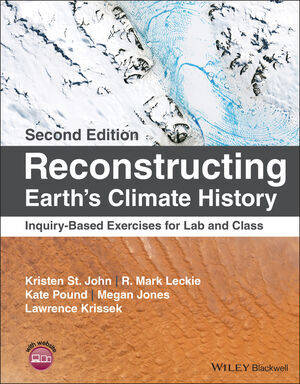
- Retrait gratuit dans votre magasin Club
- 7.000.000 titres dans notre catalogue
- Payer en toute sécurité
- Toujours un magasin près de chez vous
- Retrait gratuit dans votre magasin Club
- 7.000.0000 titres dans notre catalogue
- Payer en toute sécurité
- Toujours un magasin près de chez vous
Reconstructing Earth's Climate History
Inquiry-Based Exercises for Lab and Class
Kristen St John, R Mark Leckie, Kate Pound, Megan Jones, Lawrence KrissekDescription
There has never been a more critical time for students to understand the record of Earth's climate history, as well as the relevance of that history to understanding Earth's present and likely future climate. There also has never been a more critical time for students, as well as the public-at-large, to understand how we know, as much as what we know, in science. This book addresses these needs by placing you, the student, at the center of learning. In this book, you will actively use inquiry-based explorations of authentic scientific data to develop skills that are essential in all disciplines: making observations, developing and testing hypotheses, reaching conclusions based on the available data, recognizing and acknowledging uncertainty in scientific data and scientific conclusions, and communicating your results to others.
The context for understanding global climate change today lies in the records of Earth's past, as preserved in archives such as sediments and sedimentary rocks on land and on the seafloor, as well as glacial ice, corals, speleothems, and tree rings. These archives have been studied for decades by geoscientists and paleoclimatologists. Much like detectives, these researchers work to reconstruct what happened in the past, as well as when and how it happened, based on the often-incomplete and indirect records of those events preserved in these archives. This book uses guided-inquiry to build your knowledge of foundational concepts needed to interpret such archives. Foundational concepts include: interpreting the environmental meaning of sediment composition, determining ages of geologic materials and events (supported by a new section on radiometric dating), and understanding the role of CO2 in Earth's climate system, among others. Next, this book provides the opportunity for you to apply your foundational knowledge to a collection of paleoclimate case studies. The case studies consider: long-term climate trends, climate cycles, major and/or abrupt episodes of global climate change, and polar paleoclimates. New sections on sea level change in the past and future, climate change and life, and climate change and civilization expand the book's examination of the causes and effects of Earth's climate history.
In using this book, we hope you gain new knowledge, new skills, and greater confidence in making sense of the causes and consequences of climate change. Our goal is that science becomes more accessible to you. Enjoy the challenge and the reward of working with scientific data and results!
Reconstructing Earth's Climate History, Second Edition, is an essential purchase for geoscience students at a variety of levels studying paleoclimatology, paleoceanography, oceanography, historical geology, global change, Quaternary science and Earth-system science.
Spécifications
Parties prenantes
- Auteur(s) :
- Editeur:
Contenu
- Nombre de pages :
- 560
- Langue:
- Anglais
Caractéristiques
- EAN:
- 9781119544111
- Date de parution :
- 27-09-21
- Format:
- Livre broché
- Format numérique:
- Trade paperback (VS)
- Dimensions :
- 216 mm x 274 mm
- Poids :
- 1542 g

Les avis
Nous publions uniquement les avis qui respectent les conditions requises. Consultez nos conditions pour les avis.






